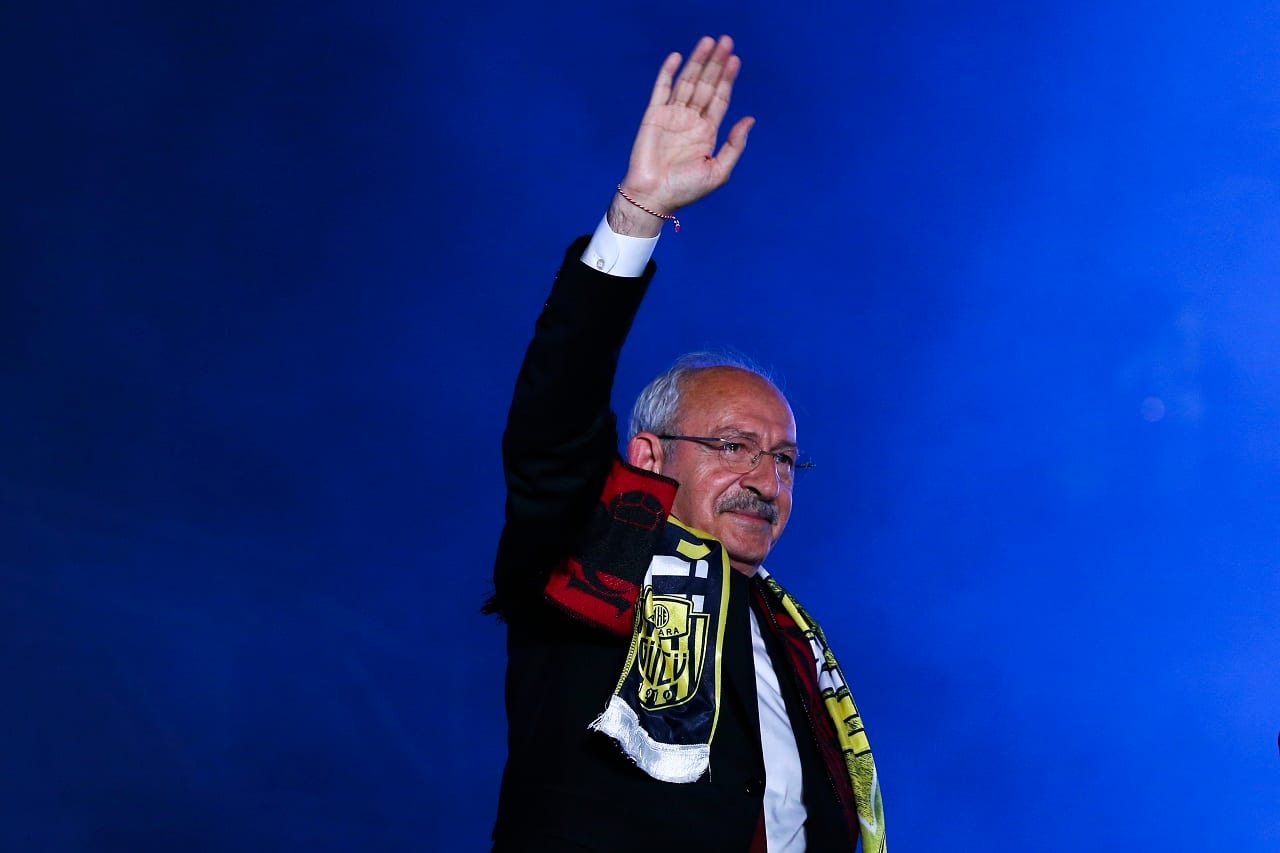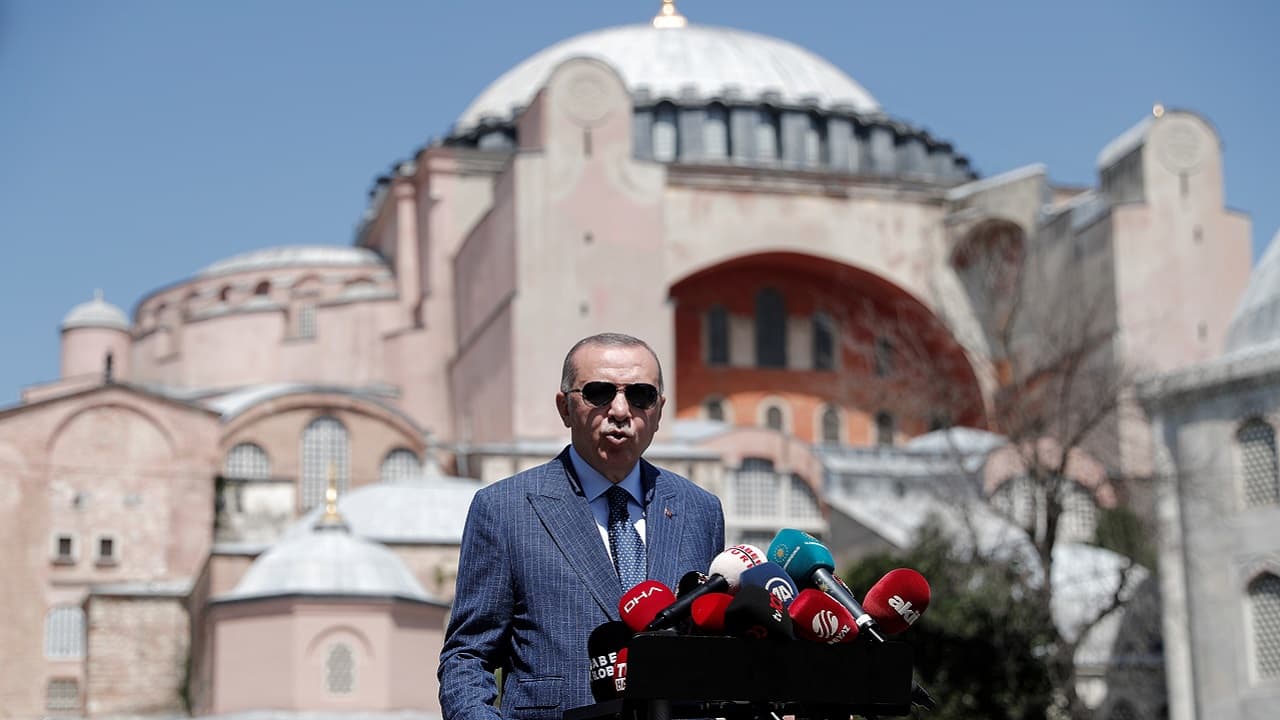
In-Depth | Turkey's Erdogan risks defeat in toughest election till date; what it means for India

In-Depth | Turkey's Erdogan risks defeat in toughest election till date; what it means for India
A
sustained spell of super-inflation, combined with high unemployment and sluggish economic growth, has taken the electoral toll on Turkey's strongman leader Recep Tayyip Erdogan, who is said to be facing the toughest poll battle in his 20-year rule so far.
Erdogan's main challenger ― Kemal Kilicdaroglu ― is predicted to receive 49.3 percent votes, whereas, the incumbent president is expected to be voted by 43.7 percent of the electorate, as per the survey released by Konda, the country's leading pollster, barely 48 hours before the May 14 election.
The main stock index was up 6 percent in response to the survey results, signalling that the financial market is rooting for a leadership rejig. Erdogan's unorthodox economic policies have been blamed for the surge in inflation that touched a high of 85.5 percent in 2022-end, and the jobless rate averaged at 10.4 percent during the past year.
The economy grew at a sluggish 5.6 percent in 2022, despite a low-base effect due to the COVID-19 pandemic, and the local currency lira has been in a free-fall, shedding 44 percent of its value in 2021 and another 30 percent last year.
The cost-of-living crisis worsened following the devastating earthquake in February, that killed more than 50,000 and left millions homeless.
 Turkish CHP party leader and Nation Alliance's presidential candidate Kemal Kilicdaroglu. The soft-spoken leader is a former bureaucrat, and had joined electoral politics in 2002 (AP Photo/Ali Unal)
Turkish CHP party leader and Nation Alliance's presidential candidate Kemal Kilicdaroglu. The soft-spoken leader is a former bureaucrat, and had joined electoral politics in 2002 (AP Photo/Ali Unal)A victory for Kilicdaroglu in the high-stake poll battle will have an impact beyond the Turkish borders, as it is expected to reshape the West and Russia's geopolitical calculations. For India, a rejig in Ankara's top political leadership could mean a reboot in bilateral ties, as Erdogan's pro-Pakistan stand and pan-Islamism agenda has created a degree of "mistrust" between the two countries, experts say.
Here's a closer look at what Erdogan's possible defeat could mean for India.
Checkmating PakistanA section of analysts believe that Pakistan may not be able to use its close bond with Turkey to internationalise the issue of Jammu & Kashmir (J&K), if Erdogan is replaced by his secular rival Kilicdaroglu.
Turkey's incumbent ruling regime is often accused of mirroring Pakistan's viewpoint against India, as Erdogan has called for a "resolution" of the Kashmir conflict for the past four consecutive years at the United Nations General Assembly, despite India marking its strong objection.
Apart from the United Nations, the Turkish government has also been raising the issue at the Organisation of Islamic Cooperation (OIC), the 57-member grouping of Muslim-majority nations.
Erdogan's AKP (Justice and Development Party) is a "modernised" offshoot of Egypt's Muslim Brotherhood, said Sanket Joshi, Research Associate, Delhi Policy Group. They adhere to the pan-Islamism agenda, and the persistent raking up of the Kashmir issue at global forums is aimed at projecting Erdogan as a "neo-Caliph of the Islamic world", he added.
 A man sells Turkish flags with the image of Mustafa Kemal Ataturk, founder of modern Turkey, next to an election campaign banner of Erdogan (AP Photo)
A man sells Turkish flags with the image of Mustafa Kemal Ataturk, founder of modern Turkey, next to an election campaign banner of Erdogan (AP Photo)On the other hand, Kilicdaroglu belongs to the CHP (Republican People's Party), the political outfit that was founded by Turkey's staunchly secular founding father Mustafa Kemal Ataturk.
Kilicdaroglu will want to project Turkey as a secular state in order to bring it closer to Europe and the West. "He will have to cut down on some of Erdogan's contentious foreign policies. This, automatically, will change Ankara's perception about New Delhi as well. The rhetoric on Kashmir will be scaled down," Joshi told Moneycontrol.
Boost to economic, strategic tiesIndia and Turkey are two of the major emerging global economies, members of the G20 grouping, hold high geopolitical and geographical relevance, and have shown semblance of an independent foreign policy by dealing with both Russia and the West despite the sharp bipolar order that has emerged after the breakout of the Ukraine war.
This commonality would have served well in enhancing the level of economic and strategic partnership "if not for the mistrust that exists" between the two countries, said Professor Aswini Mohapatra, Centre for West Asian Studies, Jawaharlal Nehru University (JNU).
According to data shared by the government of India, bilateral trade between the two countries in the April-November 2022 period stood at $9.12 billion. Indian exports accounted for $6.18 billion, and imports constituted $2.94 billion.
Erdogan's persistent remarks on Kashmir, along with his attempt to influence Muslims of the Indian subcontinent, has deepened the fissures in the bilateral ties, and has also compelled the Indian side "to start taking counter-steps, such as increasing ties with Turkey's traditional rivals like Cyprus, Greece and Armenia", Mohapatra noted.
"At a time when India is envying China economically, we need to expand economic ties with Turkey. Whether we like Erdogan or not, we cannot ignore such a key market," he added.
However, if Kilicdaroglu is elected as the new leader, bilateral relations could get a significant boost, "and that will facilitate and expedite the level of economic engagement", the professor added.
 Banner with the photograph of Kemal Kilicdaroglu in Istanbul. The presidential candidate is also referred to as 'Turkey's Gandhi', as he resembles Indian freedom movement icon Mahatma Gandhi in his looks (AP Photo)
Banner with the photograph of Kemal Kilicdaroglu in Istanbul. The presidential candidate is also referred to as 'Turkey's Gandhi', as he resembles Indian freedom movement icon Mahatma Gandhi in his looks (AP Photo)With Kilicdaroglu at the helm, Turkey can also play a key role in the West Asia rail link project ― which the US has been pushing for ― using Indian expertise, experts claim. The project was discussed during the visit of India’s National Security Advisor (NSA), Ajit Doval, to Saudi Arabia last week.
"Turkey can play a crucial role in this rail link project. However, this depends on whether Kilicdaroglu wins and succeeds in actually improving the ties with the Gulf countries and Israel," Joshi said.
Kilicdaroglu, in his manifesto, has promised to act in accordance with the national interest and not ideology-driven politics. This, say Indian analysts, suggest that if he is elected to power, Turkey could include India in its Asia Anew Initiative ― the policy designed to boost bilateral trade with Asian countries.
In December last year, Indian Ambassador to Turkey Virander Paul had signalled that New Delhi was open to be included under the framework. "Asia Anew Initiative offers new possibilities to work closer together," the envoy had told the official Anadolu News Agency.
"The inclusion under the Asia Anew Initiative programme will be important...If Turkey were to have a secular nationalist regime, that looks into its national interest and not ideological doctrination ― as mentioned in the CHP manifesto ― then it is naturally inclined towards expanding trade ties with a key market like India," Joshi said.
End to Ankara's pan-Islamism?The Turkish government, in the past two decades of Erdogan's rule, has been trying to influence Muslims in South and Southeast Asia through a concerted strategy, which experts refer to as its "neo-Ottoman policy".
An intelligence report last year said Ankara was working on a three-pronged strategy ― using media, by offering employment to Kashmiri journalists; using educational institutes to offer scholarships to Muslims across India, and using NGOs to influence Indian Muslims, The Tribune had reported.
A PTI report in September 2022 said the Insan Hak ve Hurriyetleri ve Insani Yardim (IHH), a Turkish NGO linked to the country's intelligence service, had maintained touch with the Popular Front of India (PFI), which was recently outlawed by the Indian government.
"Erdogan has expertise in playing with religious identity. Leaders like him use Islam to cement their political legitimacy within and outside the nation. Influencing Indian Muslims and Muslims in Southeast Asia is part of a larger project by Erdogan to increase Turkey's arch of influence," Mohapatra said.
 Erdogan's government had reconverted the Hagia Sophia museum into a mosque in 2021 (AFP file image)
Erdogan's government had reconverted the Hagia Sophia museum into a mosque in 2021 (AFP file image)There is a strong likelihood that the neo-Ottoman policy would be reversed if Kilicdaroglu is elected, analysts claim, pointing out his party is rooted in the ideology of "Kemalism" ― a reference to the political view of Ataturk ― and has hinted at enhancing ties with the West.
Turkey would move forward on Washington’s planned $20-billion upgrade of Turkey’s F-16 fleet, Kilicdaroglu said in a recent interview, adding that he would also maintain a "closer bond" with the US-led NATO military alliance.
"This also means that he will toe the line of the West. And if you are going to toe the line of the West, then he will have to cut down some of Erdogan's Islamist policies. This is bound to change Ankara's perception of New Delhi as well," Joshi said.
"If Kemalists win, it is quite natural that they would go back to the original vision of Turkey, that is, a modern secular vision," Mohapatra added, while stressing that "they would view the 20 years of Erdogan as an aberration".
Cue for Indian OppositionOne of the reasons that stacked the odds against Erdogan in this election was the emergence of a united opposition, with six major rival parties forming an alliance to propel Kilicdaroglu ― also referred to as 'Turkey's Gandhi' for his looks that are similar to Mahatma Gandhi ― as their joint candidate.
The 'Table of Six', as the opposition coalition is named, is preventing a major division in the anti-Erdogan votes, as per the pre-election surveys, despite the president resorting to the strategy of polarisation. Erdogan's dismissal of the rival candidate as a "sympathiser of PKK terrorist group", "supporter of LGBTQ rights" and hand-in-glove with the West has bolstered his support base, but has not succeeded in splitting the opposition's support base.
Is there something to learn for the Indian opposition that has been brutally defeated in two successive elections by Prime Minister Narendra Modi, who is also seen as a "religious nationalist leader"?
"The answer is 'yes'. But the Indian electoral game is different from Turkey, and here, there are many other factors which can swing votes in the last minute. So, theoretically, the Indian opposition can learn from the Table of Six, but the implementation will be difficult," independent researcher Sourish Ghosh said.
As seen in Turkey, a united opposition has succeeded in posing a stringent challenge to Erdogan only in the backdrop of an economy which has been acutely mismanaged, and an earthquake that exposed the scale of administrative deterioration.